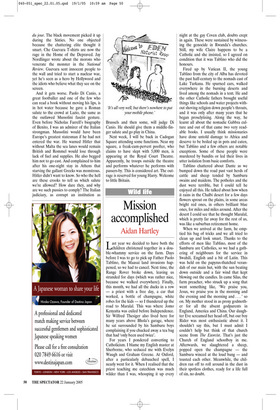Mission accomplished
Aidan Hartley
Last year we decided to have both the children christened together in a double-whammy service on the farm. Days before I was to go to pick up Father Paolo Tablino, the Maasai land invasions happened, so we had to cancel. Next time, the Range Rover broke down, leaving us stranded for days (which was rather nice, because we walked everywhere). Finally, this month, we had all the ducks in a row — a priest with a free day, a car that worked, a bottle of champagne, white robes for the kids — so I thundered up the road to Maralal. This was where Jomo Kenyatta was exiled before Independence. Sir Wilfred Thesiger also lived here for many years above Bhola’s garage, where he sat surrounded by his Samburu boys complaining if you chucked away a tea bag that had ‘only been used twice’.
For years I pondered converting to Catholicism. I blame my English master at Sherborne, who seduced me with Evelyn Waugh and Graham Greene. At Oxford, after a particularly debauched spell, I nearly went for it. When I realised that the priest teaching me catechism was much wilder than I was, whooping it up every night at the gay Coven club, doubts crept in again. These were sustained by witnessing the genocide in Rwanda’s churches. Still, my wife Claire happens to be a Catholic and she insisted, so I agreed on condition that it was Tablino who did the honours.
Fired up by Vatican II, the young Tablino from the city of Alba has devoted the past half-century to the nomads east of Lake Turkana. He spurned cars, walked everywhere in the burning deserts and lived among the nomads in a tent. He and the other Catholic fathers brought useful things like schools and water projects without shoving religion down people’s throats, and it was only after many years that he began proselytising. Along the way, he learnt all about the nomadic Gabbra culture and out of that came two very readable books. I usually think missionaries have done untold damage to Africa and deserve to be boiled up in pots and eaten, but Tablino and a few others are notable exceptions. Some of these people were murdered by bandits or led their lives in utter isolation from basic comforts.
Tablino chattered about Dante as we bumped down the road past vast herds of cattle and sheep tended by Samburu swains and maidens. The potholes and the dust were terrible, but I could tell he enjoyed all this. He talked about how when it rains in the Chalbi desert for a few days flowers sprout on the plains, in some areas bright red ones, in others brilliant blue ones, for miles and miles around. After the desert I could see that he thought Maralal, which is pretty far away for the rest of us, was like a suburban retirement home.
When we arrived at the farm, he emptied his bag of tricks and we all tried to clean up and look smart. Thanks to the efforts of men like Tablino, most of the Samburu are Catholics, so we had a gathering of neighbours for the service in Swahili, English and a bit of Latin. This was held on the papyrus-thatched verandah of our main hut, with the sun beating down outside and a fair wind that kept blowing out the candles. In came Silas, the farm preacher, who struck up a song that went something like, ‘We praise you, Jesus, we praise you in the morning and the evening and the morning and ... ’ so on. My mother stood in as proxy godmother for all the absent godparents in England, America and China. Our daughter Eve screamed her head off, but our boy Rider was most enthusiastic about it. I shouldn’t say this, but I must admit I couldn’t help but think of that church scene from The Exorcist. That’s just the Church of England schoolboy in me. Afterwards, we slaughtered a sheep, popped open the champagne — the Samburu winced at the loud bang — and toasted each other. Meanwhile, the children ran off to roll around in the dust in their spotless clothes, ready for a life full of sin, no doubt.













































 Previous page
Previous page